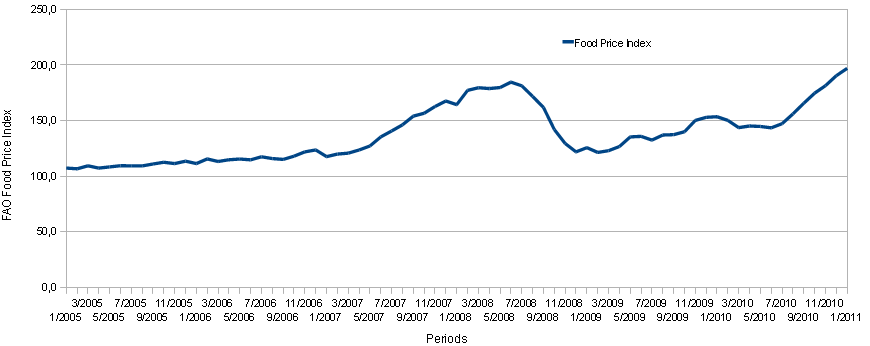World Hunger and the Silent Tsunami
In 2008, speculation in the world markets led to a peak rise in the prices of food commodities, as measured by the FAO Food Price Index (cf. Figure 1), and hunger riots in several countries in Africa (including Egypt), Indonesia and Haiti. Demonstrations were harshly repressed with ''security'' forces, including the UN in the latter, opening fire on protesters The falling prices of financial stocks encouraged investors to make money with these foodstuffs, essential to human lives, and gave way to a “silent Tsunami”, as a representative of the World Food Program (UN) labeled it.
By the end of 2010, this record was slightly surpassed with the cereal price index going up by 39 % in 2010. Over the same period, the Oil and Fats Price index went up by 55 % and the Sugar Price Index by 19 %. These figures increased even further in January 2011, the FAO indicator soaring by 3,4 % and reaching a new record, both in real and nominal terms, after seven consecutive months of inflation.
The official explanation is the unusual drought in Russia which gave way to a decrease in export, but no major event affected Sugar production last year yet its price climbed up anyways. So we can easily see that speculation is back and it is fueled by disasters as an excuse to increase stocks and therefore prices. The trade of profits for hunger across the world is therefore in large part due to the deregulation that took place during the 1990s and beginning of the 2000s, backed up by the banks, not merely natural phenomena.
This is a terrible news in a world in which 925 million people don't get enough to eat (that is almost 1 out of 6 people)1 and 1 out of 4 children – around 146 million – are underweight in developing countries 2, even though it is possible to feed the entire human kind. In a world ruled by the markets, those that can't pay are forgotten by the invisible hand (or shouldn't it rather be called the “blind” hand?).
Today the G8/G20 is officially working on solutions to prevent famine but of course nothing can be expected from leaders whose only response to the events of 2008 were bullets. These very same rulers have imposed a neoliberal (that is freedom for economic powers to do whatever they want without any restrain) globalization whose one of the main foundations is lowering the trade barriers (import taxes, mainly) in the Third World while keeping protectionism in the developed world. This allowed the further domination of multinationals, putting them in competition with the local production in the developing countries (whose economies were mostly agricultural) and destroying it with low prices (a phenomenon known as “dumping”). Now that the food commodities reach sky high prices, underdeveloped countries can't turn to their national production for a solution because the farmers, who make up three- quarters of the world's hungry , impoverished with “free trade”, have long gone to the cities looking for wage-slaved employment in factories or service sectors, often in vain.
Today almost all African countries import more cereals than they export, according to the FAO. The situation is so alarming that this organization discourages restrictions on export from these countries, imposed in order to keep the stocks within their boundaries, as this tends to increase the prices in the world market as the offer decreases. So no solution is offered within the present system : nor protectionism and its import taxes that increase prices nor liberalism and its dumping that increases poverty.
The solution will come from us, workers, all over the world. It is only through a democratically organized production that social needs will be met, not through a capitalist system. The workers, once they take both political and economical power directly in their hands, are the only ones willing to invest in agriculture in the developing world in order to prevent such disasters.
In this sense, the rebellions throughout the Arab world is a lesson to all of us. Beside their demand for “Jobs for all”, protesters are demanding lower prices and have succeeded, like in the French Caribbean in 2009, through their mobilization to impose changes. Taxes on food imports have decreased (a temporary solution) and subsidies have been granted in order to prevent a major social revolution. Other temporary solutions should include the ban of speculation and the social control over financial firms. But the real ultimate solution that we must all, in the South and in the North (where small farmers are also victims of multinationals as they are forced to sell at very low prices while the latter resell the commodities with an important profit to consumers), aim to is to confront the problem at its very root : capitalism.

Sources
1. FAO, FAO news release, http://www.fao.org/docrep/012/al390e/al390e00.pdf , 14th of September 2010
2. UNICEF, The State of the World's Children, http://www.unicef.org/sowc/, 2007
3. AFP, Flambée des prix : la FAO déconseille de moins exporter, http://www.google.com/hostednews/afp/article/ALeqM5gpCL0ovRzfgh_nBFyZ2Sl...
4. FAO, February 3rd 2011, http://www.fao.org/worldfoodsituation/FoodPricesIndex/en/
- Log in to post comments